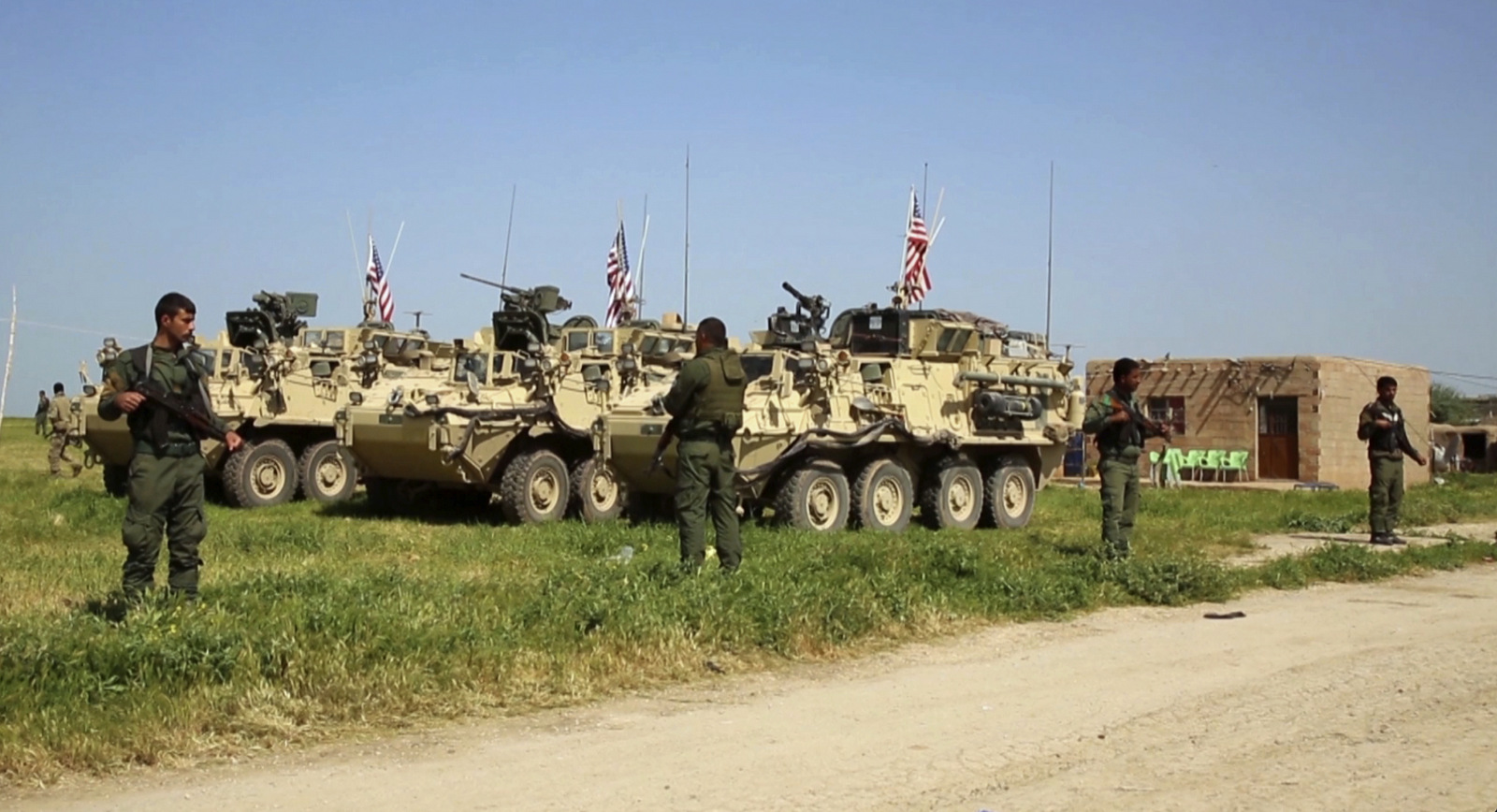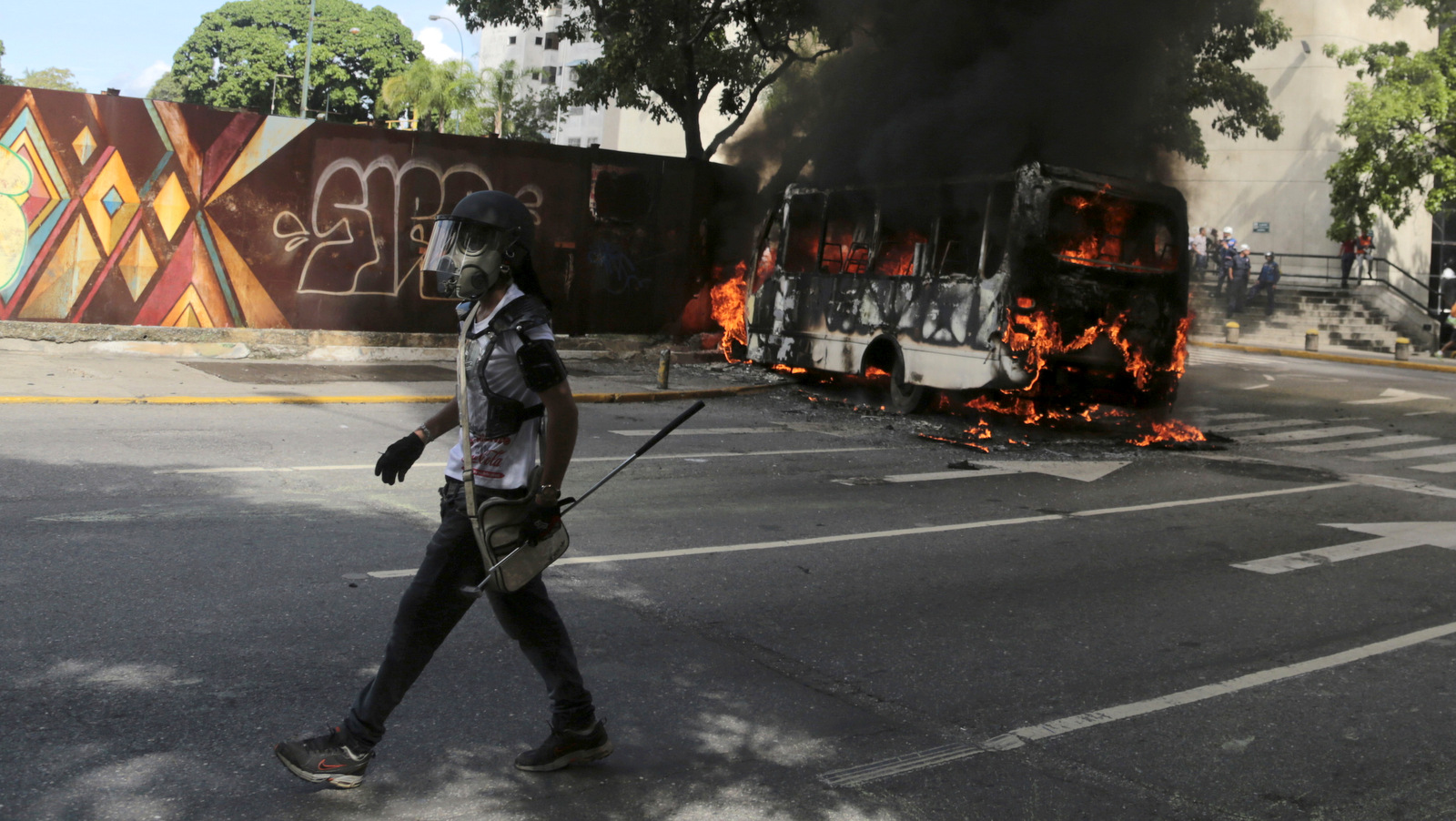
US backed Kurdish fighters of the YPG guard American military vehicles in the northern Syrian village of Darbasiyah, April. 29, 2017. (AP/APTV)
CHILE (ANALYSIS) — Separated by thousands of miles and embroiled in ostensibly unique conflicts – a “civil war” and a “political crisis,” respectively – the troubling situations in both Syria and Venezuela share more similarities than differences. These similarities owe largely to the fact that the ultimate end game for both crises is a change in national leadership or regime change.
Mainstream media outlets have spun the situations in both countries to suggest that regime change efforts are being led by ordinary Syrians and Venezuelans. But a closer examination indicates that foreign governments, particularly the U.S. and their allies, are orchestrating the conflicts themselves, as they stand to gain the most from regime change.
As was the case in both nations, foreign governments set the stage for the current crises well before they officially began. In Syria’s case, a recently declassified CIA report shows that U.S. plans to destabilize Syria date back to the late 1980s, with plans to remove Hafez al-Assad — the father of Syria’s current President Bashar al-Assad — from power. This plan was described as a means to weaken Russia’s influence on the global oil and gas as well as the arms market, as Syria was (and still is) Russia’s main Middle Eastern ally.
Regarding the current situation, U.S. embassy cables released by Wikileaks have revealed that the U.S., along with its allies Israel and Saudi Arabia, had begun planning the overthrow of the Assad government as early as 2006 by funding pro-democracy groups that would encourage regime change based on sectarian lines – despite the fact that Syria’s “civil war” did not officially begin until 2011.
In the case of oil-rich Venezuela, regime change efforts began almost as soon as Hugo Chávez assumed power in 1998, as the rise of his leftist government signaled an end to Venezuela’s once tight-knit relationship with the U.S. government. To make matters worse for the U.S., Chavez nationalized the nation’s oil industry, freeing it from the control of foreign, particularly U.S. corporations. These efforts ultimately led to a U.S.-led coup against Chávez in 2002 that ultimately failed. At the time of his death, Chávez claimed to have uncovered 19 different attempts on his life by the West.
Though the U.S. did not make any more attempts to overthrow Chavez following the failed coup, the Venezuelan government has accused the U.S. of being responsible for Chávez’s untimely death in 2013, claiming that they induced cancer that claimed his life as a covert means of assassination. Chávez’s successor, Nicolás Maduro, has been fighting wave after wave of destabilization attempts since his predecessor’s’ death.
Media manipulation used to cast Venezuelan, Syrian leaders as despots

An image distributed by the White Helmets advocating for a no-fly zone in Syria.
While both Maduro and Assad have plenty of reason to be fearful of foreign intervention, such fears have been used to cast them both as paranoid, despotic leaders who are intent on killing and oppressing their own people. Despite the fact that Chávez had been targeted by a documented coup, led by the United States in concert with right-wing groups in Venezuela and Colombia, the Western media has consistently cited Maduro’s “paranoia” as a reason to regard him with suspicion.
The Economist, in its 2015 report “Venezuela’s Crackdown: A Slow-Motion Coup,” stated, “The regime’s favorite charge to level at hostile politicians is plotting to overthrow the government, often in conspiracy with the United States.” The Washington Post wrote that same year that “Maduro accuses business owners of waging an “economic war” against him and asserts that Ledezma and other leading opposition figures are part of an international plot that also includes Colombian paramilitary forces, Venezuelan expatriates in Miami, right-wing Spanish politicians and the United States, all bent on toppling his socialist government.”
Neither of these articles, or the scores more like them, mentioned the failed coup attempt of 2002.
.@TheEconomist on Venezuela:”If armed forces withdraw support from beleaguered regime, change comes. If not, hunger and repression continue”
— Miguel Angel Santos (@miguelsantos12) May 7, 2017
“Washington has been more committed to “regime change” in Venezuela than anywhere else in South America” https://t.co/nt5x2nyspq pic.twitter.com/iGqQc2ZBH7
— Louis Allday (@Louis_Allday) April 27, 2017
While Maduro has been cast as a paranoid despot intent on clinging to power, Assad’s media coverage has been arguably worse. With headlines like “Bashar Al Assad: An Intimate Profile of a Mass Murderer,” “North Korea Congratulates Syria’s Brutal Dictator On His Recent ‘Election’,” and “As He Slaughters Civilians in Aleppo, Bashar Assad Prepares to Make Nice With Donald Trump,” it almost seems like Maduro has had it easy.
In a 2015 article published in The Atlantic titled “Bashar al-Assad and the Devil’s Endgame,” writer Dominic Tierney accused Assad of “pursuing a cynical, brutal, and risky strategy to cling to power.”
According to Tierney, the main cornerstone of this plan is to deliberately aid Daesh (ISIS) “so that the Syrian dictator looks like a lesser evil to domestic and foreign audiences.” Never mind that it is the U.S., not Assad, that has been caught aiding Daesh and that it has been Syria and its ally Russia who have been the only governments that have consistently and actively fought Daesh and erased gains made by the terrorists when only the U.S. coalition was attempting to fight them.
Another key facet of the media’s demonization of Assad is the use of the so-called “humanitarian” group known as the White Helmets.

Read Saleh left, the head of the civil defense units in the northern city of Idlib, and Farouk al-Habib, right, a media campaigner for the White Helmets, sit on a panel to draw attention to their work in Syria in midtown New York, September, 2014.
This group, above all others, has been relied on by the Western media as the face of the Syrian opposition in promoting regime change. The photos and videos the group produces that show them removing children from rubble are used as proof of the claim that Assad butchers his own people.
The White Helmets, however, have been caught faking rescue missions in their videos. Despite claiming to be impartial and completely independent from foreign money and influence, the White Helmets also receive millions in funding from Western governments, including $23 million from the U.S. alone and millions more from the British government. The group was founded by a British mercenary and promoted by a top public relations firm that specializes in war propaganda.
In addition to this, the group operates almost exclusively in areas held by the al-Nusra Front, a Syrian al-Qaeda affiliate, with whom they have collaborated with on a regular basis. Many White Helmets members have been seen with al-Nusra in assassination videos that show them to be heavily armed.
This is in stark contrast to how the media paints the White Helmets as a humanitarian civil defense group.
On March 16 the leader of HTS (Al-Qaeda in #Syria) Abu Jaber thanked the #WhiteHelmets & called them the “hidden soldiers of the revolution” pic.twitter.com/1ac8M8xb5d
— Walid (@walid970721) March 20, 2017
The White Helmets have even popped up in Venezuela. Though lacking an official name for their organization, the group is composed of “volunteer medical students” who take care of those who have been wounded in anti-government protests that have become increasingly violent. Donning white helmets with green crosses, the group – while still in its infancy – is already garnering international attention and being used to accuse Maduro of attempting to murder his own people.
U.S. fueling instability through economic sabotage

Right-wing opposition deputy Gilber Caro was charges of terrorism after Venezuelan police stopped his car and found explosives, ammunition and cash, part of an alleged plot to destabilize the government.
In addition to the media strategies used to promote foreign-led regime change in both nations, the Syrian and Venezuelan leadership have also had to contend with economic sabotage, as well as foreign funding of opposition forces to the tune of millions of dollars.
In Venezuela, the U.S. is estimated to have spent between $50 to $60 million since Chávez’s election to bolster the country’s right-wing opposition in hopes that they will win elections.
Former U.S. President Barack Obama alone dedicated $5 million to “support political competition-building efforts” in Venezuela. The U.S. Senate introduced new legislation last week that will provide an additional $20 million for “democracy promotion” efforts in Venezuela. However, some of these efforts have involved right-wing politicians and their affiliates paying protesters in cash to violently escalate what would otherwise be largely peaceful opposition rallies.

A protester wearing a gas mask and carrying a golf club walks to join fellow protesters, past a burning public transportation bus in Caracas, Venezuela, May 13, 2017. (AP/Fernando Llano)
In Syria, the U.S. has been openly funding opposition forces for most of the conflict, with hundreds of millions of dollars spent to arm and train Syria’s so-called “moderate rebels.”
In addition, both nations have been targeted by U.S. sanctions, some of which have driven Venezuela into an economic downturn. In 2015, the U.S. accused Venezuela’s government of being a “national security threat” and announced sanctions against several government officials as a result. More recently, in February, Trump sanctioned Venezuela’s vice-President, calling him a “drug kingpin” without supplying concrete evidence. Several U.S. senators are now seeking further sanctions against Venezuela.
Businesses associated with the U.S.-funded opposition have also been accused of intentionally creating scarcity with the goal of fueling unrest that could destabilize the government, a tactic that was also used against the Allende government in Chile in the 1970s.
Yet, the most damage has come from the manipulation oil prices, a concerted effort led by the U.S. and its ally Saudi Arabia. The artificial lowering of oil prices presents several benefits for the U.S.-Saudi alliance due to the economic harm it inflicts on the Saudi’s oil-producing competitors – chief among them Iran, Russia and Venezuela. These are all countries that the U.S. seeks to contain. Seeing as oil represents 90% of Venezuelan exports, its economy has been especially hard-hit.
Watch geopolitical analyst Eric Draitser discuss Obama’s Venezuelan sanctions in the larger context of the U.S. destabilization agenda:
Syria has also been the target of U.S. sanctions, the most recent of which took place in late April when the U.S. targeted 271 Syrians who were allegedly involved in manufacturing chemical weapons that the U.S. claims were used by the Assad government against civilians in Syria’s Idlib Province earlier that month. However, these claims have proven to be dubious according to evidence that has been uncovered since the attack, as well as the fact that no independent investigation into the incident has taken place.
However, these are only the latest sanctions imposed on the embattled nation as U.S. and E.U. sanctions have targeted the basic needs of everyday Syrians, not their national leaders.
As Rania Khalek noted in an article for the Intercept:
“Internal United Nations assessments obtained by The Intercept reveal that U.S. and European sanctions are punishing ordinary Syrians and crippling aid work during the largest humanitarian emergency since World War II.
The sanctions and war have destabilized every sector of Syria’s economy, transforming a once self-sufficient country into an aid-dependent nation. But aid is hard to come by, with sanctions blocking access to blood safety equipment, medicines, medical devices, food, fuel, water pumps, spare parts for power plants, and more.”
Ultimately, the goal of economic sabotage in both Venezuela and Syria is to create an economic situation so desperate that the people turn on their national leadership, blaming them for the nations’ financial woes instead of those who imposed sanctions or carried out other forms of economic warfare.
In addition, the involvement of the U.S. in both conflicts is largely driven by the U.S.’ intention of keeping key fossil fuel resources out of the hands of Russia. In the case of Venezuela, the recently introduced Senate bill to give $20 million to the Venezuelan opposition makes this clear.
From a recent MintPress report:
“Within the text of the bill, concerns are raised regarding Venezuelan state-owned oil company PDVSA and its transactions with Rosneft, a Russian state-owned oil company. As TeleSur noted: “fearful that PDVSA could default on its $4- and $5-billion dollar loans from Rosneft, regardless of Venezuela’s steadfast debt repayments, the bill warned that Rosneft could come into control of PDVSA’s U.S. subsidiary, CITGO Petroleum Corporation, which ‘controls critical energy infrastructure in 19 States in the United States.’” Seeing as Russia has already seized Venezuelan oil for unpaid bills despite their political alliance, this fear is not unfounded.”
The Syrian conflict also involves competing gas pipeline interests. One of the pipelines, which favors the interests of U.S. allies, was outright rejected by Assad, who wanted to protect the interest of Russia, Syria’s greatest ally.
As The Guardian reported in 2013:
“Assad refused to sign a proposed agreement with Qatar and Turkey that would run a pipeline from the latter’s North field, contiguous with Iran’s South Pars field, through Saudi Arabia, Jordan, Syria and on to Turkey, with a view to supply European markets – albeit crucially bypassing Russia. Assad’s rationale was ‘to protect the interests of [his] Russian ally, which is Europe’s top supplier of natural gas.’”
While conventional understanding suggests that the conflicts in Syria and Venezuela are wildly different, a closer examination of the nuances of the current crises shows that U.S.-led regime change efforts, whether covert or overt, often involve using the same tactics in order to ensure the same overarching motive – global dominance.
Source Article from http://www.mintpressnews.com/u-s-destabilizes-venezuela-syria-to-retain-hegemony-in-global-oil-gas-markets/227831/
Related posts:
Views: 0
 RSS Feed
RSS Feed

















 May 16th, 2017
May 16th, 2017  Awake Goy
Awake Goy 





 Posted in
Posted in  Tags:
Tags: 
















